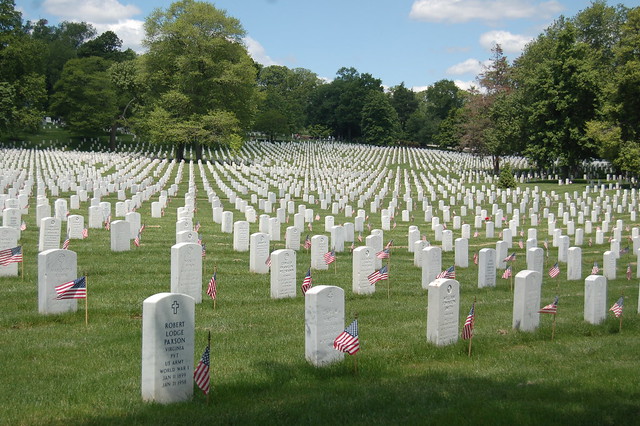 Memorial Day was made a formal holiday after the Civil War. Then called "Decoration Day," it was observed by decorating the graves of deceased soldiers. That tradition still continues, most famously at Arlington National Cemetery. There are also parades and services held across the country.
Memorial Day was made a formal holiday after the Civil War. Then called "Decoration Day," it was observed by decorating the graves of deceased soldiers. That tradition still continues, most famously at Arlington National Cemetery. There are also parades and services held across the country.Those who died defending our country unquestionably deserve our recognition, honor, and gratitude. However, I fear that some of these heroes are missed when we limit Memorial Day to those who died in battle - the true number of lives lost due to war is much higher.
I don't have specific statistics to offer you, but there are at least two categories of soldiers whom I consider casualties of war, even though they die after returning home.
1) Those whose injuries cause lasting damage, ultimately contributing to death at some point in the future. For example, my grandfather received a bayonet wound in WWII that damaged his heart. He survived the injury, but eventually died when I was a baby, as a result of the injury sustained in battle. I suspect the number of others whose wounds ultimately proved fatal is high.
2) Those who are unable to readjust to civilian life, and die as a result of homelessness, crime, or suicide. We know that veterans are among those at highest risk for completed suicide, both because the attempt more often than the general population, and because they use more lethal means. I think that they should also be considered casualties of war, because the mental and emotional damage is just as real and physical injury, and sometimes more devastating.
The first category of losses may or may not be preventable, depending on the injury. However, we should certainly work to ensure that veterans receive the best medical care, to prevent needless deaths, minimize impairments, and increase quality of life for those who have been injured. While VA medical centers do often provide a high quality of care, there are a surprising number of barriers to individual veterans getting care - including red tape, waiting lists, and distrust of the system.
The second category of losses should certainly be preventable, and yet we have not found ways to help all of our veterans successfully transition into civilian life, nor have we found ways to overcome stigma associated with mental health treatment, to heal the mental and emotional injuries of war. We need to do a better job of helping veterans to find jobs, financial security, housing, support integrating back into their families, and treatment when needed.
The best way we can honor those who gave their lives is to honor those who served and survived, and to work toward a world where such sacrifice will become unnecessary.
No comments:
Post a Comment